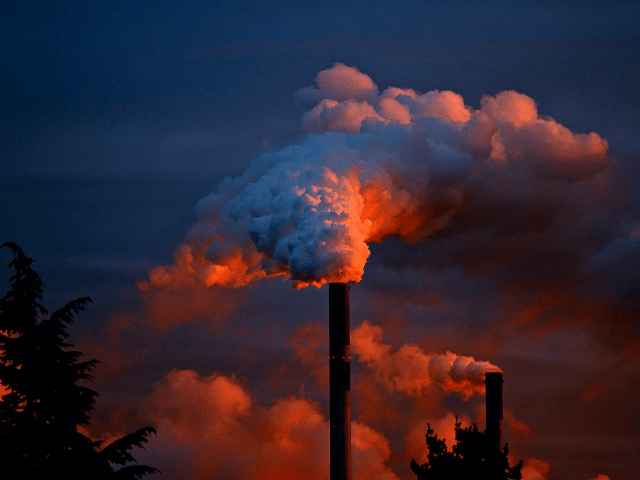In a major new study, the Lancet journal has revealed that pollution-related diseases were responsible for an estimated 9 million premature deaths in 2015, or some 15 times more than from all wars and other forms of violence combined.
Pollution is not only the largest environmental cause of disease and premature death in the world today, the study in the prestigious UK-based journal found, but diseases caused by pollution were responsible for roughly 16 percent of all deaths worldwide—“three times more deaths than from AIDS, tuberculosis, and malaria combined and 15 times more than from all wars and other forms of violence.”
While to date there has not been a single documented case of a person being killed by carbon dioxide related “global warming,” real pollution of air, water and land is killing an average of 25,000 people every day across the globe.
So as environmental activists jet around the world complaining of “carbon footprints” and preaching “renewable energy” while insisting that first-world countries be taxed for their carbon dioxide emissions, they are silent regarding the real and present menace that is wiping out millions of human beings around the world.
Although environmental Green activists like to talk of “carbon pollution,” in point of fact carbon dioxide (CO2) is not a “pollutant” at all. CO2 is colorless, odorless and completely non-toxic. Plants depend on it to live and grow, and human beings draw some into their lungs with every breath they take to no ill effect whatsoever.
Growers regularly pump CO2 into greenhouses, raising levels to three times that of the natural environment, to produce stronger, greener, healthier plants.
Moreover, current levels of carbon dioxide concentration in the environment are substantially lower than they have been during earlier periods in the planet’s history. Without human intervention, the concentration of CO2 has climbed as high as 7,000 parts per million (ppm) in prior eras, whereas at present the concentration is just over 400 ppm.
Some experts on the environment, such as UN climate scientist Dr. Indur Goklany, have defended rising CO2 levels as a good thing for humanity. Goklany has argued that the rising level of carbon dioxide in the earth’s atmosphere “is currently net beneficial for both humanity and the biosphere generally.”
“The benefits are real, whereas the costs of warming are uncertain,” he said.
Meanwhile, however, real pollution continues to plague many parts of the world, causing devastating health problems including disease and death.
In the most severely affected countries, the Lancet report states, “pollution-related disease is responsible for more than one death in four.”
Many have decried the evils of “climate change” and specifically its supposed effects on the poor of the world. Pope Francis, for instance, recently argued that climate change was one of the two root causes of world hunger, a claim that has no basis in scientific fact.
Pollution, on the other hand, “disproportionately kills the poor and the vulnerable,” the Lancet study found. “Nearly 92% of pollution-related deaths occur in low-income and middle-income countries and, in countries at every income level, disease caused by pollution is most prevalent among minorities and the marginalised.”
Not only does environmental pollution disproportionately target the poor, it also targets the young.
“Children are at high risk of pollution-related disease and even extremely low-dose exposures to pollutants during windows of vulnerability in utero and in early infancy can result in disease, disability, and death in childhood and across their lifespan,” the study revealed.
The real tragedy, therefore, is not the immense devastation wrought by pollution, but the willingness of the powerful of the world to ignore it in favor of an ideologically driven crusade against “global warming.”
“Despite its substantial effects on human health, the economy, and the environment, pollution has been neglected, especially in low-income and middle-income countries, and the health effects of pollution are under-estimated in calculations of the global burden of disease,” the Lancet states.
This health damage from pollution “has particularly been overlooked in both the international development and the global health agendas,” the report continues.
“Although more than 70% of the diseases caused by pollution are non-communicable diseases, interventions against pollution are barely mentioned in the Global Action Plan for the Prevention and Control of Non-Communicable Diseases,” it reads.
The highly touted “Paris Climate Accord,” for instance, shamelessly prates about greenhouse gas emissions without ever once mentioning the word “pollution” in the entire 27-page document.
And not only is pollution control not getting better, in many parts of the world, “pollution is getting worse.”
Ambient air pollution, chemical pollution, and soil pollution “are all on the rise, with the most marked increases in rapidly developing and industrialising low-income and middle-income countries,” the Lancet study found.
Pollution is a problem that can be addressed and defeated. The big question is why environmental activists and the mainstream media insist on looking the other way.
Follow Thomas D. Williams on Twitter Follow @tdwilliamsrome

COMMENTS
Please let us know if you're having issues with commenting.